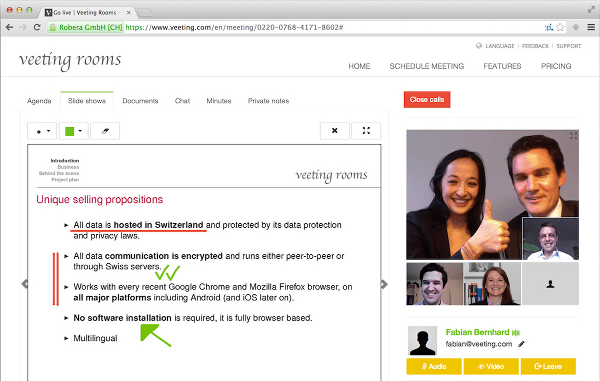Maintaining video conferencing privacy.
If you have boatloads of money, you probably have some in a Swiss bank account. In the past, it was considered to be a safe place to bet your privacy on.
 A company called Veeting Rooms is literally banking on that, by placing their whole service in Switzerland, adhering to local laws and regulation – and putting privacy at the front of their marketing pitch.
A company called Veeting Rooms is literally banking on that, by placing their whole service in Switzerland, adhering to local laws and regulation – and putting privacy at the front of their marketing pitch.
I had an interesting chat with Philipp Baumann and Fabian Bernhard, the founders of Veeting Rooms. Here’s what they had to say.
What is Veeting Rooms all about?
Philipp: Veeting rooms aims to make web conferencing easier for SME’s world wide. Today setting-up a video-conference is still somewhat cumbersome. WebEx is widely used among large corporations. From our personal experience, most certainly one participant will have trouble joining the web conference, as he or she can’t install the software. From all the web conferences I’ve done, I don’t think I can remember one which has started on time. There’s no reason why web conferencing shouldn’t be as simple as making a phone call. And this is where Veeting Rooms comes in. It all works in your browser, there are no plugins or software you have to download. We have found that the process for joining meetings (particularly the first time for guests using the tool) is a critical component of the user experience. Veeting.com is therefore such a huge gain in user experience.

Why yet-another-video-calling-service? What’s different in Veeting Rooms?
Philipp: Veeting Rooms is more than just a browser based video calling service. As we are a business solution we provide a virtual meeting environment designed for businesses, where you can conduct audio & video conferences and share a presentation in real time with all invitees. With the pen tool all participants can draw on a presentation to highlight important areas during a discussion. Veeting Rooms also includes additional tools, such as text chat, secure document exchange, collectively writing the meeting minutes or taking private notes. Many other tools completely neglect the scheduling part of meetings. In business meetings are most of the time planned in advance. Veeting.com allows you to schedule meetings and generate a unique meeting link for a certain time period in the future, e.g. in 2 days at 14.00 for 2.5 hours!
Privacy seems to be a big focus for Veeting Rooms? What’s the idea behind it?
Philipp: NSA. Snowden. Big Data, the Cloud. Large companies like Google, Facebook, Twitter, etc. are fighting for data supremacy, which is why more and more businesses are thinking about data privacy and ask themselves who else is reading their business data that they upload to the servers of their service provider. We host the entire service including the STUN/TURN servers within the Swiss jurisdiction, where data privacy is granted by strong Swiss data protection and privacy laws. We have prudently chosen our service providers and only work with local providers we know and trust. For instance, our SSL certificates were provided by a Swiss company rather than an American one. Furthermore we don’t even use Google Analytics to protect the privacy of our users. All data communication from and to our servers, including the peer-to-peer audio and video conversations are fully encrypted.
What excites you about working in WebRTC?
Fabian: I have worked for many years in the SIP and Unified Communication industry, having been the chief architect for OEM softphones by one of the leading Unified Communication solution providers. I always thought that making audio and video conversations easier is a great thing and an interesting field of work because it effects human interaction directly. On the other hand, I was never 100% satisfied with the solutions we have created because they always required our users to download and install software. What makes WebRTC so exciting and why we believe it will be a big game-changer, is that it runs directly in the web browser without the need for additional software downloads.
From a software developer perspective the most exciting thing about WebRTC is that it is so easy. Software Developers don’t have to care anymore about codec negotiations for instance. Also, because there is no signaling standard one can define a very small subset without worrying about use cases that are defined in a specification but hardly ever used in the real world. For us, the lack of a signaling specification is a plus rather than a minus.
Backend. What technologies and architecture are you using there?
Fabian: It was clear from the beginning that we needed to have an asynchronous architecture. Conversations are always asynchronous, the initial feature set for our Veeting Rooms had many asynchronous elements. We have chosen Node.js for our application server because it is an excellent choice for web applications and provides all the characteristics set we need, such as scalability.
As for the WebRTC part we have early on decided not to re-invent the wheel, especially because we wanted to create a meeting room service rather than a technical framework. After careful evaluation of the existing Javascript libraries we have decided to use easyRTC. We are very happy with the choice, it provides all we needed for our solution. In addition, the creators of the easyRTC library are very engaged and have built a productive community around their Open Source offering.
Where do you see WebRTC going in 2-5 years?
Philipp: WebRTC will certainly be a catalyst for audio & video in the Internet and we are going to see quite some innovative new applications. Therefore also Apple and Microsoft will sooner or later support the WebRTC standard. Promising is that Apple has also started to attend W3C WebRTC Working Group meetings. Therefore there is hope that Apple will support WebRTC in Safari, both in OSX and iOS.
Fabian: What makes us very positive is the support of the telecom industry and their suppliers. All big names such as Broadsoft, Avaya, etc, have or are building support for WebRTC into their products. This will be a huge boost in the adoption of this standard. We see WebRTC to become THE standard for realtime, web based communication.
If you had one piece of advice for those thinking of adopting WebRTC, what would it be?
Fabian: Don’t say “no” to adopting WebRTC simply because the Internet Explorer does not support it yet.
Given the opportunity, what would you change in WebRTC?
Fabian: We wouldn’t change much. What we would like to see soon though are three things: high quality screen sharing across browsers, Internet Explorer support and a specification and implementation of an Open Source MCU for large conferences. These features are most asked for in our target market segment, which we cannot support as of now. We are very optimistic that all three developments will happen sooner than later.
What’s next for Veeting Rooms?
Philipp: A constant factor in our development is to make Veeting Rooms as simple as possible, we want to provide an excellent user experience to our customers. As such our development plan is driven by the feedback of our customers, since they can tell us best what their needs are.
Besides the constant improvement of our Veeting Rooms we have defined the following two large milestones. First we will create an alternative for Internet Explorer users. IE is still the most used browser in the business world, sadly also in many SMEs. We are looking forward to present our solution in the coming 1 – 2 month. Of course, it will still be WebRTC! In the medium term we are seeing SIP integration through an MCU as an important factor to increase our market. This will allow Veeting participants to dial in using their desk phone or from places where they don’t have access to high speed internet, such as airports or trains.
–
The interviews are intended to give different viewpoints than my own – you can read more WebRTC interviews.
